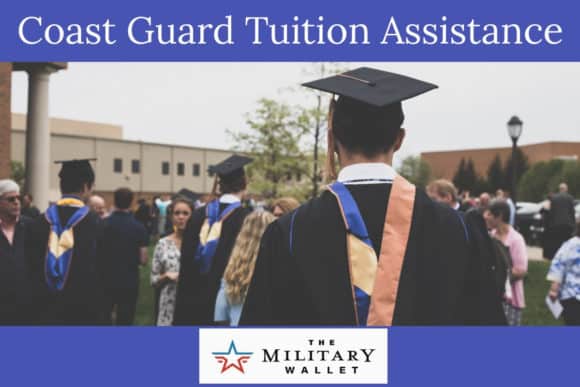Education benefits are one of the military’s most popular and valuable benefits. Using Tuition Assistance or the GI Bill to obtain a degree can not only improve your military career prospects, but it can also improve your lifetime earning potential. College education benefits are one of the top reasons people join the military.
The GI Bill is the most popular and well-known military education benefit. But it is mostly associated with taking college courses after leaving the military. Military members can also use Tuition Assistance (TA) benefits to take college courses while serving on active duty.
Using TA can be a great way to get a head start on your education. It’s also what I used to complete my degree while serving on active duty in the Air Force.
Each branch of the military offers Tuition Assistance benefits. The DoD authorizes each branch to provide education benefits of up to $250 per semester hour. However, each military branch can authorize different amounts.
Today, we will cover the Coast Guard Tuition Assistance Program, including eligibility, benefits amounts, and other necessary information.
Coast Guard Tuition Assistance Rates
The Coast Guard will fund tuition costs not to exceed $250.00 per semester hour, $166.67 per quarter hour, or $16.67 per clock hour.
TA has an annual maximum or “cap” of $4,500. This represents a $750 increase from the previous annual maximum of $3,750.
- The annual cap falls within each fiscal year (1 October to 30 September).
- Once the member uses the maximum allotted amount per year, no waivers will be granted for additional money.
- The established TA cap does not mean the Coast Guard guarantees to pay the full amount. Budget constraints may require further TA policy changes.
See below for more ways to pay for your college education.
What Does Coast Guard TA Cover?
Tuition Assistance is available for undergraduate & graduate courses up to Master’s Degrees. TA covers tuition up to $250 per semester hour, $166.66 per quarter hour, or $16.67 per clock hour.
TA cannot be used for books, fees, or other non-tuition expenses. Any other college expense not listed as tuition is considered a fee (e.g. lab, graduation, internet usage, etc.).
Schools authorized to receive TA funding must participate and have a signed MOU with the DoD. The authorized school list can be found at the following website: www.dodmou.com.
Reimbursement of TA will be required from the service member if the student does not successfully complete the course(s). For the purpose of reimbursement, a successful course completion is defined as a grade of a C or higher for undergraduate courses, a B or higher for graduate courses, and a pass for pass/fail grades.
Eligible Study Programs
Tuition Assistance is only available for Coast Guardsmen seeking their first degree at the Associate, Bachelor, and Masters levels. TA will not be granted for coursework at the same level or lower than a degree already possessed by the student. In other words, you can use TA to achieve an Associate’s or Bachelor’s Degree if you do not already have a degree at that level, but you can’t use TA to achieve a second degree at the same level.
TA can also be used for the following programs:
High School Completion Programs:
- Tuition for approved high school completion programs will be fully funded for personnel who have not been awarded a high school or equivalency diploma.
Developmental Courses:
- Developmental courses may be authorized if required by the Institution prior to taking a higher-level course.
- Many colleges require a developmental Math, English, and reading course if the member has been out of school for several years.
- Usually, these courses (usually numbered starting with zero “0” as the first digit) are “not transferable.”
Coast Guard Tuition Assistance Eligibility
Tuition Assistance eligibility has undergone a few changes, similar to those recently enacted by the Air Force and Marines.
TA is available to Coast Guardsmen who meet the following criteria:
- Member must be on Active Duty or a Reservist on long-term orders greater than 180 days,
- COs, OICs, or first O-6/GS-15 in the chain of command are expected to ensure members meet the following eligibility criteria:
- (1) Satisfactory progress toward completion of unit quals,
- (2) Satisfactory progress toward watch station quals,
- (3) Satisfactory proficiency of craft, and
- (4) Satisfactory conduct during the six months prior.
Service requirements – Enlisted
- Active duty enlisted members must meet all requirements set forth in the latest ALCOAST or standing policy in order to utilize TA.
- Active duty members must complete the TA-authorized course(s) on or prior to RELAD, discharge, or retirement.
- If member is going to RELAD and provides documentation showing that he/she will be in the SELRES, then TA authorized course(s) may begin in active duty status and be completed in SELRES status.
Service requirements – Officer
- Active duty officers must meet all requirements set forth in the latest ALCOAST or standing policy in order to utilize TA.
Lifetime Learning Credits:
Lifetime credit hour limits for TA are as follows: 130 semester hours for undergraduate work and 40 semester hours for graduate work. Once a member has reached credit hour limits, TA will no longer be authorized regardless of whether the member has obtained a degree or not.
Who is not eligible for Tuition Assistance benefits:
According to the official Coast Guard Workforce site, “Tuition assistance benefits will not be extended to civilian employees, Coast Guard Reservists in a drilling status and those active duty Coast Guardsmen pursuing a graduate degree or another degree at the same level which they already possess. Additionally, tuition assistance will not be available to active duty members who do not demonstrate satisfactory progress toward watch station qualifications, sufficient proficiency of craft and good conduct.”
Here is the new Coast Guard Tuition Assistance Policy.
Alternative Funding Sources for Coast Guard Members
Any form of Tuition Assistance benefits is a great benefit and can help you achieve your education goals more quickly. However, with the rising cost of tuition, the $4,500 annual cap on Coast Guard TA benefits doesn’t go very far.
These TA limits don’t mean Coast Guardsmen won’t be able to achieve their educational goals. It just means they need to be more creative when planning their coursework.
Coast Guard members may be eligible to complete coursework or earn college credits through other means. For example, you can view the Coast Guard Education and Training Quota Management Command (ETQC) website funding and reimbursement programs for education expenses.
In addition, Coast Guardsmen are still eligible to take CLEP and DANTES courses. These credit-by-examination courses are free and offer college credit upon passing. These exams played a large role when I achieved my degree while on active duty.
Many higher education institutions also offer credits for military service, potentially eliminating some required coursework en route to achieving a degree.
Additional funding sources for college credits include utilizing the Montgomery GI Bill, Post-9/11 GI Bill, scholarships, grants, and other ways to pay for college.
Non-Coast Guard (federal and state) sources for need-based or merit-based financial aid can be found at https://studentaid.ed.gov (including Pell grants, scholarships, and loans).




About the comments on this site:
These responses are not provided or commissioned by the bank advertiser. Responses have not been reviewed, approved or otherwise endorsed by the bank advertiser. It is not the bank advertiser’s responsibility to ensure all posts and/or questions are answered.